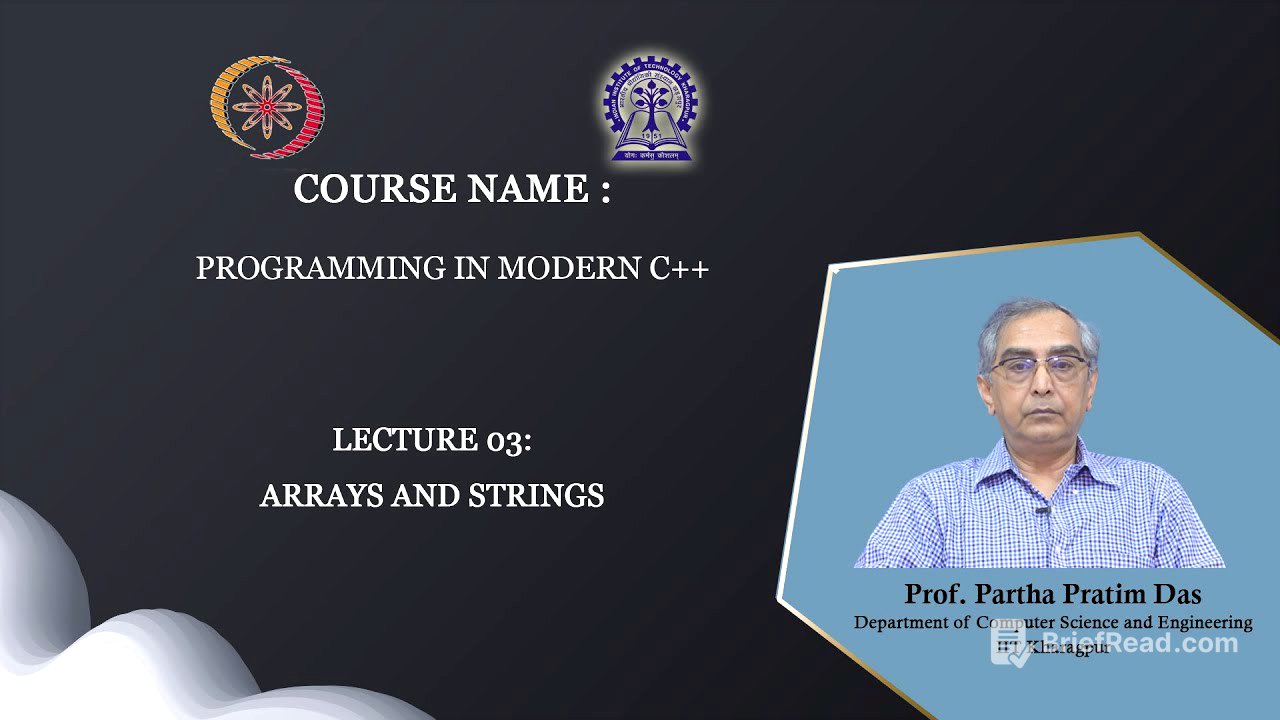TLDR;
This module compares the use of arrays and strings in C and C++. It highlights the advantages of using vectors in C++ for array manipulation, including dynamic resizing and simplified syntax. Additionally, it introduces the string type in C++ and its benefits over C-style strings, such as convenient operators for concatenation and comparison.
- C++ offers vectors for dynamic array management, simplifying resizing and memory handling compared to C's manual memory allocation.
- The C++ string type provides convenient operators for string manipulation, making code more readable and less error-prone than C's string.h functions.
- Vectors and strings in C++ are as efficient as their C counterparts, with minimal overhead.
Arrays and Vectors in C++ [1:43]
In C, arrays of fixed size are declared with a specific length and type, and the syntax remains the same in C++. However, when dealing with arrays of unknown or arbitrary size, C++ introduces vectors. Vectors are a type defined in the C++ library, requiring the inclusion of the <vector> header. Vectors offer dynamic sizing, allowing the number of elements to be specified at declaration or resized later. This provides flexibility compared to C, where dynamic allocation with malloc is needed, and resizing is more complex.
Dynamic Array Allocation and Resizing [8:56]
C requires the use of malloc to dynamically allocate memory for arrays, specifying the size in bytes and managing memory allocation manually. In contrast, C++ simplifies this process with vectors. You can declare a vector without an initial size and then resize it using the resize function. This allows dynamic adjustment of the array size at runtime, which is not possible with malloc in C. Resizing a vector automatically handles memory reallocation and copying of elements, making it easier to manage dynamic arrays in C++.
Strings in C and C++ [14:54]
In C, strings are represented as arrays of characters terminated by a null character (\0). String manipulation is performed using functions from the string.h library, such as strlen, strcpy, and strcat. C++ introduces a string type defined in the standard library, offering convenient operators for string manipulation. Unlike C, C++ strings support operators like + for concatenation and = for assignment, simplifying string operations. Additionally, C++ allows the use of C-style string functions by including <cstring> in the std namespace.
String Concatenation and Operations [17:57]
C++ simplifies string concatenation using the + operator, eliminating the need for functions like strcpy and strcat in C. The assignment operator = in C++ strings over writes the string with a new value, similar to strcpy in C. C++ strings also support comparison operators like <, >, and ==, equivalent to strcmp in C. These features make string manipulation more concise and easier to manage in C++ compared to C.
C++ String Library Features [23:52]
The C++ string library provides a variety of features, including constructors, destructors, and iterators. Iterators are used to traverse the string, allowing operations on individual characters or substrings. The string type supports various forms of iterators, such as begin to end, reverse, and constant iterators. Additionally, the C++ string library offers functions for appending characters, resizing strings, and other advanced operations. Many of these features do not have direct equivalents in C's string.h library, providing greater flexibility and functionality in C++.
